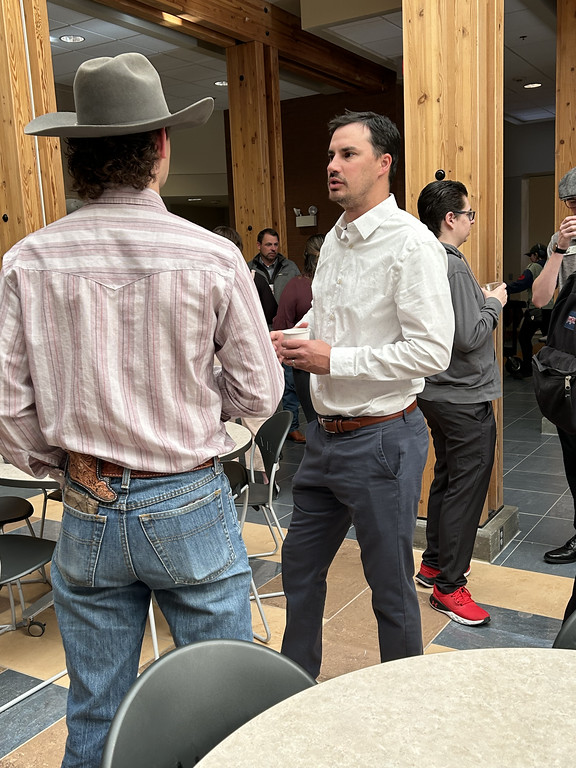Rural Roundtable brings together students and local business and legal professionals

CHADRON – Students in the Rural Business Leadership Initiative (RBLI) and Rural Law Opportunities Program (RLOP) met with business and legal leaders from throughout the Panhandle at the Rural Roundtable organized by Project Manager Kate Pope last week. She said the students liked the unstructured coffee hour conversations with local professionals and have asked for similar events in the future.
Clint Lecher, general manager of Eagle Chevrolet Buick in Chadron, Matt Watson, an attorney with the Crites and Shaffer Law Office in Chadron, and Megan Dockery, an attorney with Simmons Olsen Law Firm in Scottsbluff, commented on the RBLI and RLOP programs at CSC.
Lecher said programs like RBLI are essential.
“Students who are attuned to the needs of rural areas are better equipped to find appropriate and realistic solutions for their clients and communities,” Lecher said.
He said the challenge to students leaving to chase success in metropolitan areas can be countered by meeting the opportunity to show students that they can find a lifestyle in a rural area that comes with not only potential financial success but also the overall safety and comfort of small-town living.
Lecher said he views the work ethic of rural graduates as one of their obvious qualities as a valued employee.
“The ability to show up, work hard, put in the extra effort and maybe extra time, is incredibly valuable. Potential employees who come from a rural background often come with those qualities ingrained in them from growing up on or around farms or ranches where putting in a solid day of work is just a way of life,” Lecher said.
Lecher said the CSC programs focused on developing business professionals among its graduates can play a vital part in growing the rural workforce.
“By continuing to seek out and build relationships with businesses in the small communities in our area, these programs open up a lot of doors to students they may not have seen,” Lecher said.
Watson said access to high-quality, local, legal services is vital to the health and future of rural communities.
“The backbone of rural communities are small businesses and agriculture. Rural community members need legal services to have opportunities to open a new business, sell or purchase an existing business, and successfully start or transition agricultural operations. Without access to legal services, these opportunities will vanish, and rural communities will struggle,” Watson said.
Dockery said ag producers and small business owners need access to local attorneys who understand the unique challenges that rural communities face.
“Rural attorneys can help fill that gap and provide the advice, services, and representation these businesses need. Local attorneys in our rural communities are crucial in ensuring that people have the legal assistance and representation they need and deserve,” Dockery said.
Dockery said some of the unique challenges faced in rural communities include a lack of resources including programming, materials, and funding.
Dockery said one of the skills and abilities she sees as crucial among rural attorneys is the ability to build relationships and earn trust.
“Additionally, rural attorneys often help their clients with many different legal needs, so the ability to be well-rounded and knowledgeable in multiple areas of the law is invaluable,” Dockery said.
Category: Business, Campus News, Justice Studies, Student Clubs & Organizations
